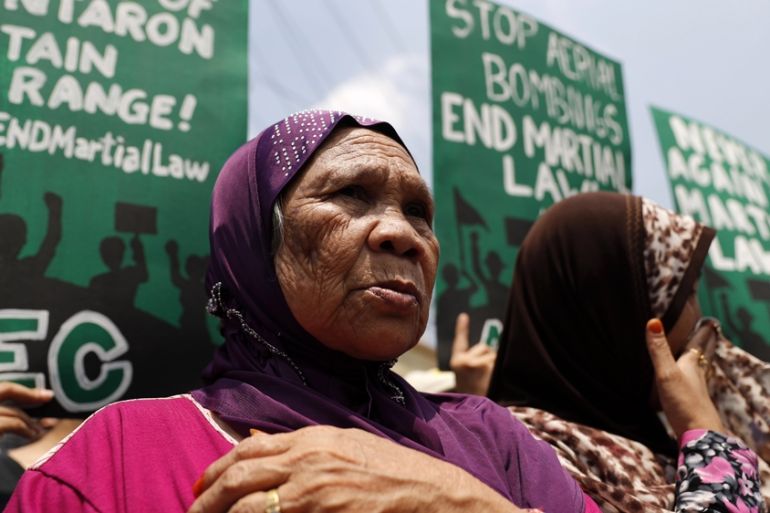Philippines: Maranao people oppose Marawi rehabilitation plan
Representatives of the indigenous people native to Marawi speak out against government’s plans for war-torn city.

Manila, Philippines – Members of the Maranao tribe, the indigenous people native to Marawi, have opposed the government’s plans to build China-funded commercial centres and a military garrison over the ruins of the five-month battle between government forces and the pro-ISIL Maute armed group.
Having travelled the 1,000km distance from their hometown to the capital Manila, Maranao civic leaders and academics made a last-minute attempt on Tuesday to overhaul the blueprint for rebuilding their war-ravaged city.
Keep reading
list of 4 itemsPalestinian Prisoner’s Day: How many are still in Israeli detention?
‘Mama we’re dying’: Only able to hear her kids in Gaza in their final days
Europe pledges to boost aid to Sudan on unwelcome war anniversary
Marawi, situated on the southern island of Mindanao, was the site of a bloody urban battle between Islamic State of Iraq and the Levant (ISIL, also known as ISIS) fighters and government forces.
ISIL fighters laid siege to the city in May last year, prompting months of heavy combat that forced hundreds of thousands to flee and left more than 1,000 dead.
“You are monetising our dignity,” cried Tirmizy Abdullah, a young university professor, while speaking in a conference hall full of government officials, diplomats and human rights advocates.
“They tell us we are obstinate, that we refuse to accept what’s good for us. But the problem is they would not let us decide what is good for us. They must take us for fools.”
Around 140,000 Marawi residents remain displaced and are camped in tents, schools and other public spaces outside the city. Their return has been blocked by the government which has cordoned off the former war zone.
|
|
Military officials said the area is littered with unexploded bombs, and it would take months, even years, to clear them.
In the months following the city’s “liberation”, the government drafted plans to build a “better and stronger” city.
In April, Task Force Bangon Marawi, the committee leading the effort, presented pictures of gleaming steel-and-glass malls, government halls and mosques, manicured parks, and megalithic structures.
The Maranao, however, were immediately wary and at a media conference to mark the siege’s anniversary in May, Maranao congressmen pointed out that every inch of land in the city’s 250-hectare former war zone was spoken for.
Why prioritise the military over helping the displaced residents
“Taking away land is as good as taking away a Maranao’s citizenship,” said Moctar Matuan, a retired professor from the Mindanao State University in Marawi.
“The Maranao identity is tied to the land. It is what makes one a Maranao.”
Government contractors have been scouting Marawi, sparking rumours of a clandestine plan to parcel out the city centre to big businesses.
The government denies it is leaving the Maranao out of rehabilitation plans, saying it held several consultation sessions with local “stakeholders”.
Military camp
The government also revived a 1953 presidential decree that designated almost all of Marawi as a military reservation, despite the fact that it had long been inhabited by the Maranao.
President Rodrigo Duterte said the decree justifies the plan to build a second military camp in the city, adding that it will prevent further attacks.
“Why prioritise the military over helping the displaced residents,” said Abdullah, adding that the plan contradicts Duterte’s promise to “correct historical injustices” against the Maranao and other Mindanao tribes.
Teresita Deles, a former peace process secretary, organised Tuesday’s conference because she said those people deserved a safe space to air their side of the story at the country’s seat of power.
“We are here today to hear stories of Marawi from the city’s residents themselves,” said Deles at the conference.
“Right now, what they need is more than iron fists, or military solutions, or the glitzy promises of Chinese-funded rehabilitation, or fingers to point, or trending hashtags and viral posts, or grand plans for reconstruction.”
The first thing the Maranao need, Deles said, is to be heard.
|
|